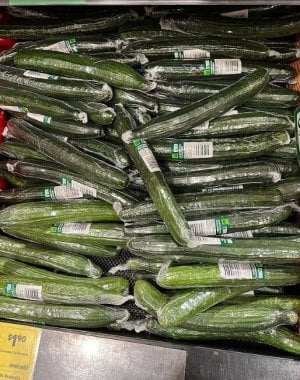What’s wrong with this photo of cucumbers wrapped in plastic, and why are Woolworths customers angry about it?
- Replies 22
When it comes to environmental concerns, we are no strangers to the conversation. Many have witnessed firsthand the effects of pollution on our beautiful Australian landscape throughout the decades.
So, when news emerged of plastic-wrapped cucumbers being sold at a Woolworths store in Canberra, many shoppers were up in arms.
Australian journalist James Massola shared a picture on the social media platform Twitter showcasing the individually shrink-wrapped continental cucumbers on display at the Woolworths store in Canberra.
Massola expressed his disappointment in the use of plastic packaging despite Woolworths banning single-use plastic bags – a move that had been widely praised.
‘I think the ACT government's plastic bag ban was a terrific decision. But the decision by Woolworths to individually plastic-wrap cucumbers (and some other vegetables) defeats the purpose of a plastic ban. Also, why on earth do cucumbers need to be wrapped?’ He questioned in his post.
The sentiment was echoed by many others who shared in Massola's outrage.
‘Agreed. Here we are trying to reduce the volume of plastics in our life and our environment, and they make it unavoidable!' said one user.
‘Woolies were all anti-plastic when they decided to stop providing them free at checkouts, so now you have to buy paper bags, but not so anti-plastic on the shelves,’ another replied.
However, a range of other opinions arose as people began to discuss the matter, with some shoppers defending Woolworths and explaining the reasoning behind the plastic wrapping.
These supporters pointed out that the packaging helps reduce food waste by keeping the cucumbers fresher for longer.
‘Continental cucumbers dehydrate quickly, become limp, and are vulnerable to damage during their journey from the greenhouse to your fridge. By acting as a second skin, the plastic film extends their shelf-life by almost a full week,’ wrote one social media user.
‘They last dramatically longer wrapped. So, it actually reduces waste,’ another commented.
‘It’s minimal environmental impact compared to throwing out a cucumber that’s rotten in half the time,’ someone else replied.
Woolworths responded to reporters, acknowledging the delicate balance between removing plastic packaging and reducing food wastage.
‘We're working to make grocery shopping more sustainable, and we're always looking to understand what changes can deliver the most benefit for the environment,’ the Woolworths spokesperson said.
‘While removing plastic is always our first preference, in some cases, it's a balancing act where we also need to consider food waste carefully. Some fresh produce items in Woolworths’ range are packaged to help extend shelf life and reduce food waste. For example, a continental cucumber wrapped in plastic lasts three times longer than one that isn't,’ they explained.
Since 2018, Woolworths has set a range of targets to improve the sustainability of its brand packaging.
The supermarket giant hopes to achieve an average of 60 per cent recycled content across Own Brand packaging by the end of 2025 and aims to halve the use of virgin plastic packaging by 2024.
This issue comes after it was announced that ALDI is embracing eco-friendly packaging by introducing its brown paper bags to shoppers.
The decision to move towards environmentally-conscious solutions is estimated to remove more than 888 tonnes of plastic circulation annually. You can read the rest of the story here.
 Members, what do you think about the use of plastic packaging in supermarkets? Is it an important way to help keep fresh produce fresher for longer, or is it something that needs to be paid more attention to? Let us know in the comments section below!
Members, what do you think about the use of plastic packaging in supermarkets? Is it an important way to help keep fresh produce fresher for longer, or is it something that needs to be paid more attention to? Let us know in the comments section below!
So, when news emerged of plastic-wrapped cucumbers being sold at a Woolworths store in Canberra, many shoppers were up in arms.
Australian journalist James Massola shared a picture on the social media platform Twitter showcasing the individually shrink-wrapped continental cucumbers on display at the Woolworths store in Canberra.
Massola expressed his disappointment in the use of plastic packaging despite Woolworths banning single-use plastic bags – a move that had been widely praised.
‘I think the ACT government's plastic bag ban was a terrific decision. But the decision by Woolworths to individually plastic-wrap cucumbers (and some other vegetables) defeats the purpose of a plastic ban. Also, why on earth do cucumbers need to be wrapped?’ He questioned in his post.
The sentiment was echoed by many others who shared in Massola's outrage.
‘Agreed. Here we are trying to reduce the volume of plastics in our life and our environment, and they make it unavoidable!' said one user.
‘Woolies were all anti-plastic when they decided to stop providing them free at checkouts, so now you have to buy paper bags, but not so anti-plastic on the shelves,’ another replied.
However, a range of other opinions arose as people began to discuss the matter, with some shoppers defending Woolworths and explaining the reasoning behind the plastic wrapping.
These supporters pointed out that the packaging helps reduce food waste by keeping the cucumbers fresher for longer.
‘Continental cucumbers dehydrate quickly, become limp, and are vulnerable to damage during their journey from the greenhouse to your fridge. By acting as a second skin, the plastic film extends their shelf-life by almost a full week,’ wrote one social media user.
‘They last dramatically longer wrapped. So, it actually reduces waste,’ another commented.
‘It’s minimal environmental impact compared to throwing out a cucumber that’s rotten in half the time,’ someone else replied.
Woolworths responded to reporters, acknowledging the delicate balance between removing plastic packaging and reducing food wastage.
‘We're working to make grocery shopping more sustainable, and we're always looking to understand what changes can deliver the most benefit for the environment,’ the Woolworths spokesperson said.
‘While removing plastic is always our first preference, in some cases, it's a balancing act where we also need to consider food waste carefully. Some fresh produce items in Woolworths’ range are packaged to help extend shelf life and reduce food waste. For example, a continental cucumber wrapped in plastic lasts three times longer than one that isn't,’ they explained.
Since 2018, Woolworths has set a range of targets to improve the sustainability of its brand packaging.
The supermarket giant hopes to achieve an average of 60 per cent recycled content across Own Brand packaging by the end of 2025 and aims to halve the use of virgin plastic packaging by 2024.
This issue comes after it was announced that ALDI is embracing eco-friendly packaging by introducing its brown paper bags to shoppers.
The decision to move towards environmentally-conscious solutions is estimated to remove more than 888 tonnes of plastic circulation annually. You can read the rest of the story here.
Key Takeaways
- A furious shopper criticised Woolworths for selling plastic-wrapped cucumbers despite its ban on single-use plastic.
- Australian journalist James Massola shared a picture of shrink-wrapped continental cucumbers sold at a Woolworths store in Canberra, sparking mixed reactions on social media.
- Some defended Woolworths, stating that plastic wrapping reduces food waste by keeping cucumbers fresh for longer.
- Woolworths explained that it is a balancing act between removing plastic packaging and food wastage, and they are working to make grocery shopping more sustainable while considering the environmental impact.










